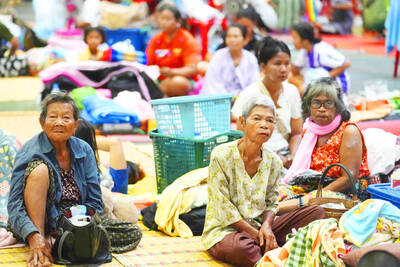It was once the nightmare of air travelers the world over: a passenger jet parked in a remote corner of an airport surrounded by armed police and ambulances.
The frightening scene that played out last week at Amsterdam’s Schiphol Airport turned out to be a false alarm. However, it revived memories of an aviation era when hijackings were more common than in the post-Sept. 11 world of ultra-tight security checks at airport gates, air marshals on flights and reinforced cockpit doors.
Figures compiled by the International Civil Aviation Organization show seven “unlawful seizures” of planes in 2001, the year of the al-Qaeda attacks on the US. The highest number in any year since was five in 2009. The group recorded no airliner seizures in 2010 or last year.
Despite the drop, authorities are far from complacent and attempted attacks continue — the group showed acts including sabotage attempts rising from just two in 2005 to 14 in 2009 before dropping off sharply to three last year.
Philip Baum, editor of Aviation Security International, said the current security measures are a strong deterrent.
“People feel that the powers that be are very security conscious and are looking out for people,” he said.
Many existing security measures were introduced or strengthened in the aftermath of Sept. 11, 2001, when al-Qaeda militants hijacked four commercial jets in the US.
Shortly after Dutch air traffic controllers lost contact with the pilots of Spanish carrier Vueling’s Airbus A320, two F16 fighter jets were scrambled and flashed over the pancake-flat landscape, setting off a sonic boom as they broke the sound barrier on their way to intercept the plane and make visual contact with its pilots to make sure nothing was wrong.
It appears that not just post-Sept. 11 security is at play. Analysts who have studied hijackings say the phenomenon was already on the decrease well before Sept. 11.
Harro Ranter, a Dutchman who compiles a list of hijackings from official sources and media reports, says many hijackings in the 1960s and early 1970s — the most prolific era for taking over aircraft — were by people trying to escape from or get to communist regimes.
“When the Soviet Union fell apart, that led to a decline in attempted hijackings,” he said.
However, Baum said terrorists are likely already plotting ways of beating current airline security and predicted they could even try surgically implanting explosives in the body of a suicide bomber to beat airport scanners.
He said airports should be using scanners capable of recording what was in passengers’ bodies, not just objects concealed in or under their clothes.
“[Existing] body scanners are a major improvement on metal detection, but realistically we’re buying into the wrong type of scanners,” he said.

FOREST SITE: A rescue helicopter spotted the burning fuselage of the plane in a forested area, with rescue personnel saying they saw no evidence of survivors A passenger plane carrying nearly 50 people crashed yesterday in a remote spot in Russia’s far eastern region of Amur, with no immediate signs of survivors, authorities said. The aircraft, a twin-propeller Antonov-24 operated by Angara Airlines, was headed to the town of Tynda from the city of Blagoveshchensk when it disappeared from radar at about 1pm. A rescue helicopter later spotted the burning fuselage of the plane on a forested mountain slope about 16km from Tynda. Videos published by Russian investigators showed what appeared to be columns of smoke billowing from the wreckage of the plane in a dense, forested area. Rescuers in

POLITICAL PATRIARCHS: Recent clashes between Thailand and Cambodia are driven by an escalating feud between rival political families, analysts say The dispute over Thailand and Cambodia’s contested border, which dates back more than a century to disagreements over colonial-era maps, has broken into conflict before. However, the most recent clashes, which erupted on Thursday, have been fueled by another factor: a bitter feud between two powerful political patriarchs. Cambodian Senate President and former prime minister Hun Sen, 72, and former Thai prime minister Thaksin Shinawatra, 76, were once such close friends that they reportedly called one another brothers. Hun Sen has, over the years, supported Thaksin’s family during their long-running power struggle with Thailand’s military. Thaksin and his sister Yingluck stayed

‘ARBITRARY’ CASE: Former DR Congo president Joseph Kabila has maintained his innocence and called the country’s courts an instrument of oppression Former Democratic Republic of the Congo (DR Congo) president Joseph Kabila went on trial in absentia on Friday on charges including treason over alleged support for Rwanda-backed militants, an AFP reporter at the court said. Kabila, who has lived outside the DR Congo for two years, stands accused at a military court of plotting to overthrow the government of Congolese President Felix Tshisekedi — a charge that could yield a death sentence. He also faces charges including homicide, torture and rape linked to the anti-government force M23, the charge sheet said. Other charges include “taking part in an insurrection movement,” “crime against the

POINTING FINGERS: The two countries have accused each other of firing first, with Bangkok accusing Phnom Penh of targeting civilian infrastructure, including a hospital Thai acting Prime Minister Phumtham Wechayachai yesterday warned that cross-border clashes with Cambodia that have uprooted more than 130,000 people “could develop into war,” as the countries traded deadly strikes for a second day. A long-running border dispute erupted into intense fighting with jets, artillery, tanks and ground troops on Thursday, and the UN Security Council was set to hold an emergency meeting on the crisis yesterday. A steady thump of artillery strikes could be heard from the Cambodian side of the border, where the province of Oddar Meanchey reported that one civilian — a 70-year-old man — had been killed and